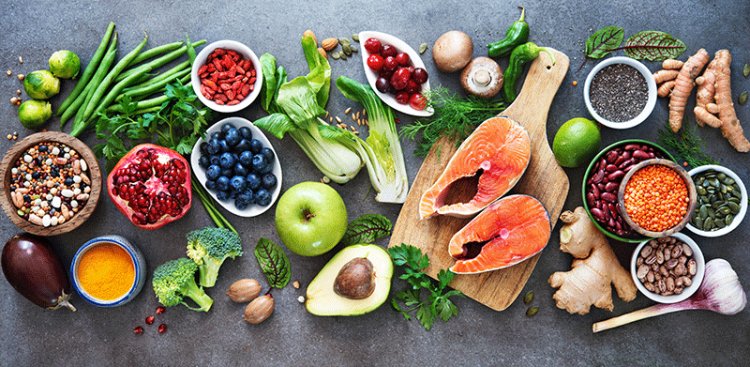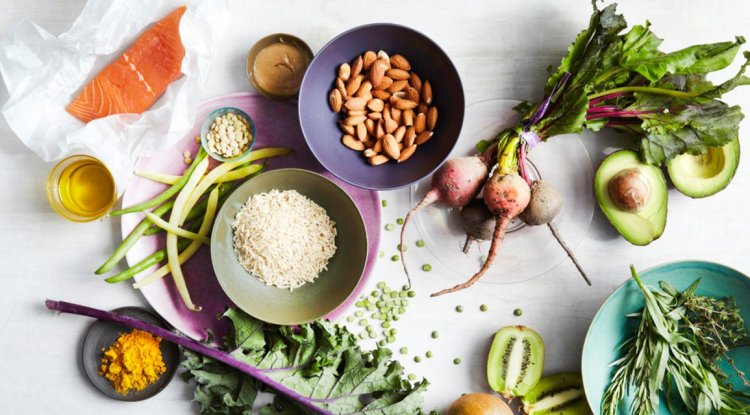Nutrient-Rich Diets for Optimal Health: A Comprehensive Guide
Unlock the secrets of Nutrient-Rich Diets for Optimal Health. Discover expert insights and practical tips to enhance your well-being. Explore the benefits and create a personalized plan for a healthier lifestyle.

Introduction
Good nutrition is at the core of our good health and well-being. Currently, a large percentage of the population lacks sufficient nutrients due to an imbalance in modern diets. However, with a little effort, we can all adopt diets rich in nutrients that nourish our bodies from the inside out.
In this comprehensive guide, I will discuss the key nutrients our bodies need for optimal health and how to incorporate more of these nutrients into our daily eating patterns. We will explore individual nutrients like vitamins, minerals, antioxidants, proteins, fiber etc. and showcase food sources rich in each of these. I will also share sample menu plans and meal ideas that showcase the perfect combinations of nutrients. My goal is to equip you with sufficient knowledge to design balanced, nutritious diets for yourself and your loved ones.
With small, sustainable changes to our diets, we can prevent nutrient deficiencies and enhance our overall well-being. So let's get started on our journey towards optimal health through nutrient-dense whole foods!
Chapter 1: Macronutrients - The Foundation of Nutrition
Our bodies cannot function properly without an adequate, balanced supply of macronutrients - proteins, carbohydrates, and fats. These macronutrients provide our bodies with energy and building blocks for growth, development and repair of cells. They should form the foundation of any healthy diet.
Proteins
Proteins are made of amino acids and are the building blocks of our muscles, bones, skin, and blood. They play a key role in growth, maintenance and repair of cells in our bodies. Most health experts recommend getting 10-35% of our total daily calories from high-quality protein sources.
Some excellent sources of protein include:
- Lean meats: Chicken, turkey, fish, eggs
- Plant-based proteins: beans, lentils, nuts, seeds, nut butters, soy, edamame
- Dairy: Greek yogurt, cottage cheese
Aim to include a protein source like beans/lentils, eggs or fish at both lunch and dinner. You can complement your proteins with carbohydrates and fats at each meal.
Carbohydrates
Carbs give us sustained energy and much-needed fuel for physical activity and brain function. Complex carbohydrates like whole grains are preferable to refined carbs as they digest more slowly, regulating blood sugar levels. Around 45-65% of our daily calories should come from carbs.
Fiber-rich carb sources include:
- Whole grains: Brown rice, oats, quinoa, millet, barley
- Starchy veggies: Sweet potatoes, butternut squash, carrots
- Fruits: All types of whole fruits except juice
- Beans/Legumes: Kidney beans, chickpeas, lentils
A rule of thumb is to pair your carb servings with a fiber-rich veggie or two at every meal. Space out your carb intake evenly through the day for steady energy levels.
Fats
Dietary fats are essential for the absorption of fat-soluble vitamins, cell health, hormone production and more. Focus on obtaining fats from wholesome plant and fish sources.
Good sources are:
- Nuts: Almonds, walnuts, pumpkin seeds
- Nut butters: Almond butter, peanut butter
- Oil: Olive oil, avocado oil, mixed nut oils
- Fatty fish: Salmon, sardines, trout
- Avocados
Aim for 2-3 servings of healthy fats spread across your meals to meet recommended daily fat intake levels. Combined with protein and carbs, fats balance your meals nutritionally.
Chapter 2: Micronutrients - Meeting Daily Vitamin and Mineral Needs
In addition to macronutrients, our bodies require micronutrients or vitamins and minerals in small but significant amounts every day. These micronutrients help regulate and carry out thousands of chemical reactions in our bodies. Let's look at some key vitamins and minerals and dietary sources rich in each.
Vitamin A
Required for vision, cell growth and immune function. Sources are:
- Carrots
- Sweet potatoes
- Leafy greens like spinach
- Mangoes
Vitamin C
An antioxidant vitamin that boosts immunity and promotes wound healing. Find it in:
- Citrus fruits: Oranges, grapefruit
- Berries: Strawberries, raspberries
- Bell peppers
- Broccoli
Vitamin D
Essential for bone and teeth health. Our bodies produce it from sun exposure as well. Dietary sources are:
- Fatty fish: Salmon, tuna, mackerel
- Mushrooms
- Fortified foods like plant milks
Vitamin E
An antioxidant vitamin protecting cell membranes from damage. Good sources are:
- Nuts: Almonds, hazelnuts
- Sunflower seeds
- Vegetable oils like sunflower oil
- Avocados
Vitamin K
Important for blood clotting. Leafy greens like kale, spinach, collards are very high in this vitamin.
Calcium
Builds strong bones and teeth. Dairy products like Greek yogurt, cottage cheese are rich in calcium. Other options include sardines eaten with the edible bones, broccoli, soybeans.
Iron
Transports oxygen in red blood cells. Lean meat, beans, lentils, leafy greens are iron powerhouses. Pair them with a vitamin C source for better absorption.
Magnesium
Supports bone health and energy production. Avocados, seeds, beans, nuts, leafy greens, banana are magnesium minefields.
Potassium
Regulates heart function and blood pressure. Potatoes, avocados, bananas, spinach are excellent potassium sources.
Aim for ample variety in your fruits, vegetables, whole grains, legumes and nuts to meet your daily micronutrient needs without supplements. Focus on plant-based whole foods for the best nutrition package.
Chapter 3: Antioxidants - The Stars of Good Health
Antioxidants are the star players in keeping diseases at bay and slowing aging. These substances protect our cells from oxidative damage caused by free radicals produced during normal metabolic processes or environmental exposures. Eating antioxidant-rich foods daily is key for radiant health and wellness.
Top Antioxidant All-Stars
Berries - Strawberries, blueberries, blackberries are bursting with antioxidants. Enjoy them as snacks, in salads or plain.
- Citrus fruits - Oranges, grapefruit contain antioxidants like vitamin C, flavonoids.
- Bell peppers - Sweet and hot peppers provide an antioxidant punch. Eat them raw or cooked.
- Tomatoes - Cherry or grape tomatoes, fresh salsa, tomato sauce - you can't go wrong with the antioxidant lycopene from tomatoes.
- Green tea - Brew a cup of green tea daily for antioxidants like EGCG helping reduce inflammation in the body.
- Turmeric - A key compound in turmeric called curcumin has potent antioxidant and anti-inflammatory benefits. Add turmeric to dishes for flavor and healing properties.
- Dark chocolate - In moderation, the cocoa powder in high-percentage dark chocolate has beneficial flavanols. Enjoy a small square daily.
- Herbs and spices - Oregano, rosemary, ginger, cinnamon, cloves - Fresh herbs and whole spices elevate antioxidants.
- Go Nuts! - Almonds, walnuts, pumpkin seeds - Tree nuts and seeds are antioxidant and mineral powerhouses.
- Extra virgin olive oil - Use unrefined olive oil for dressings, dips and light cooking. It contains antioxidants that prevent chronic disease.
Variety is the name of the game when it comes to maximizing your antioxidant intake. Focus on incorporating antioxidant-dense whole foods at every meal and snack time. Your health will thank you!
Chapter 4: Plant-Based Eating for Optimal Nutrition
A predominantly whole food, plant-based diet is amongst the healthiest nutrition patterns. It is loaded with protective antioxidants, vitamins, minerals, fiber and other health-promoting plant compounds. It has proven benefits for reducing chronic disease risk.

Why focus on plant foods?
- Vegetables, fruits, whole grains, legumes, nuts, seeds are low in calories yet very nutritionally dense. They leave you feeling fully satiated compared to processed foods.
- Plants are high in fiber helping weight, cholesterol and blood sugar management besides promoting regular bowel movements. Fiber also keeps us feeling full for long periods.
- Antioxidants, vitamins, minerals in plant foods protect our cells from damage thereby preventing illness and aging.
- Whole plant foods give us sustainable energy without the negative effects of excess calories, sugar or fat.
- They are naturally low in unhealthy saturated fat and sodium yet high in heart-healthy unsaturated fats, minerals and antioxidants.
- Plant-based diets reduce inflammation in our bodies associated with chronic diseases like cancer, heart disease and arthritis.
- Environmental and ethical benefits from consuming less meat and more sustainable plant options.
FAQs
What's Your Reaction?




















